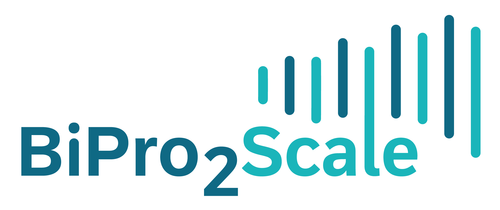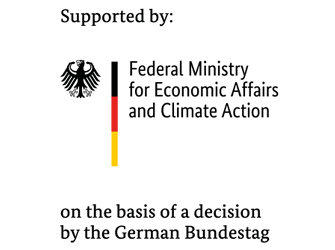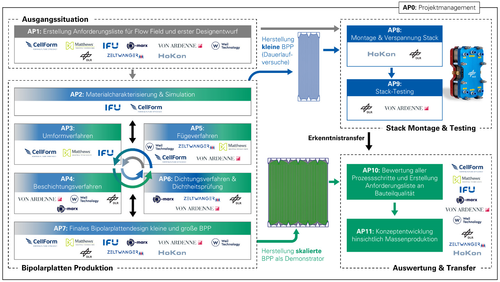The project addresses the development of PEM fuel cells for a power range of at least 1 megawatt for aviation, maritime applications and rail transportation as well as for stationary power generation systems. PEM fuel cells that cover such power ranges can only be achieved with upscaled bipolar plates (BPP) with an area of at least 1000 cm², for which product and process development must be completely rethought.
In the project, new approaches for media supply and distribution within the BPP and the stack are being developed from a product technology perspective, as well as forming and joining processes and coating and sealing concepts that are necessary to realize such BPPs.
Nine companies and institutions are involved in the project: CellForm Hydrogen GmbH & Co. KG, Matthews International GmbH, VON ARDENNE GmbH, Weil Technology GmbH, C-marx GmbH, ZELTWANGER Holding GmbH, HoKon GmbH & Co. KG, German Aerospace Center (DLR) and University of Stuttgart, Institute of Forming Technology (IFU).
In addition, the project is supported by 11 associated national and international participants, including Zeppelin Power Systems GmbH, H2FLY GmbH, TRUMPF SE & Co. KG, SIEMENS, Wickeder Westfalenstahl GmbH, ZAPP Precision Metals GmbH, Raziol Zibulla & Sohn GmbH, HYDAC International GmbH, Enapter GmbH, Electric Hydrogen GmbH & Co. KG, Altair Engineering GmbH.
The project is funded by the Federal Ministry for Economic Affairs and Climate Protection as part of the funding guideline "Applied non-nuclear research funding" in the 8th energy research program "Innovation Energiewende".
Project goal
The joint project BiPro2Scale aims to implement an innovative concept for large-scale, highly scaled, metallic BPP in an energy-efficient and cost-effective manner from a production technology perspective. This scalable BPP is intended to enable a previously unattained output of over 1 MW in a single stack. At the same time, alternative materials for the metallic BPP, the coating and the seal are to be investigated and used in order to significantly increase the service life of the stacks.
The project therefore focuses on the holistic value creation process of the BPP, starting with the semi-finished film product and its forming into bipolar half-plates (BHP), through the joining of the individual half-plates to the leak test and coating of the BPP in the joined or assembled state. Both the individual production steps and their technical and financial interactions with each other are considered. The flow-field concept to be developed for large-scale scaled BPP is constantly evaluated from the point of view of product performance as well as sustainable and economical production. In order to achieve this overall objective, the consortium is pursuing the approach described below.
Significance and outlook
The developed know-how for the production of large-scale scaled BPP is summarized in a virtual production concept and potentials for industrial series production are determined.
Through the cooperation of the consortium, which brings together renowned participants from industry and science, the joint project BiPro2Scale can become a pioneer for the industrial production of scaled BPP for PEMFCs with a power range of over 1 MW. In terms of the EU's total greenhouse gas emissions, this opens up a savings potential of over 8% - and the trend is rising. All participating industrial companies see the results as part of their future strategy and plan to implement the technical systems developed in their business areas in order to open up new markets.
In addition, each of the project participants will act as a multiplier for the results achieved both during and after the project. This means that each of these participants will directly transfer their innovation to the fuel cell industry.
Furthermore, the academic participants in the consortium will publish at least some of the results in specialist journals and in the form of specialist papers at national and international meetings and conferences in order to increase the visibility of the participating German institutions in research areas of fuel cell technology both nationally and internationally.
The participation of industrial companies and research institutions also ensures a target-oriented compromise between innovation and the feasibility of the technological and scientific project objectives. This ensures that the scientific content developed with regard to BPP design, simulation methods and manufacturing processes can be transferred to application in a timely manner and meet the requirements and objectives of the participating industrial companies.
The participants
CellForm Hydrogen
In recent years, CellForm Hydrogen GmbH & Co KG has established itself as an innovative player in the field of process development and production for metallic BPP. The company produces BPPs that are highly efficient thanks to their high forming quality and filigree design. Prototypes and series orders have been successfully manufactured and tested in various projects for a global customer base. The applications range from fuel cells for mobile (aviation, heavy goods transport) and stationary applications (decentralized power and heat supply) to electrolysers, which is why the company has adopted the most flexible and efficient production strategy possible for a wide range of product requirements (materials, dimensions, forming degrees).
Matthews International
SAUERESSIG, as part of Matthews International GmbH, is a leading and innovative full-range supplier of calendering, embossing and rotary processing systems in standard and special designs. The product portfolio includes both complete production lines and individual systems for embossing, finishing, smoothing, perforating and calibrating web-shaped materials. In addition to individual solutions for the converting industry, Matthews Engineering develops and manufactures pioneering systems for the production of battery and fuel cell components. This includes calendering systems, embossing units and embossing rollers for BPP production. The embossing rollers are processed in-house using high-precision laser engraving and milling techniques. In the Competence Center at the Vreden site, extensive testing facilities and versatile laboratory equipment also enable the targeted new and further development of technologies and embossing layouts.
VON ARDENNE
VON ARDENNE develops and manufactures systems for the industrial vacuum coating of materials such as glass, wafers, metal strip or polymer film. Depending on the application, these layers are one nanometer to a few micrometers thin and give the materials new functional properties. Our customers use these materials to manufacture high-quality products such as fuel cells, solar cells, architectural glass and vehicle glazing, lithium-ion batteries or microelectronic components for sensors and optics. With more than 60 years of experience in electron beam technology and over 50 years of expertise in magnetron sputtering, VON ARDENNE is still a pioneer and leading global provider of systems and technologies in PVD thin-film and vacuum process technology.
Weil Technology
As a machine manufacturer and solution provider, Weil Technology helps to implement new production processes in sheet metal processing and to optimize, automate and make existing ones more sustainable. The company's core competencies are machines for sheet metal processing using laser welding and cutting with coordinated clamping and automation concepts. Weil Technology can look back on over 35 years of experience in this field. Around 250 employees develop and manufacture customer-specific concepts and systems at the company headquarters in Müllheim, South Baden.
ZELTWANGER
ZELTWANGER Leaktesting & Automation GmbH is one of the leading providers of solutions for leak testing with air and detection gases. The portfolio ranges from testing-as-a-service offerings, test devices and test stations to fully automated test systems. ZELTWANGER offers its customers comprehensive support, from initial preliminary tests through to series production. In the field of e-mobility, the company offers leak testing solutions for battery cells and packs, bipolar plates, fuel cells, electrolysers, electric motors and their components.
C-marx
C-marx GmbH is a special machine manufacturer specializing in industrial inkjet printing. In this segment, the company offers customer-specific solutions for functional printing and additive manufacturing processes. In addition to integration solutions in existing production systems, new complete systems are also developed for these applications. C-marx is contributing this expertise to the joint project for an innovative process for applying the sealing structure to bipolar plates.
HoKon
HoKon GmbH & Co. KG develops, designs and manufactures mounting systems for fuel cells and H2 tank systems. HoKon also undertakes special assemblies and designs that are developed and manufactured according to customer requirements. HoKon is a leading supplier of closure, connection and fastening technology. In the field of hydrogen, especially fuel cells, HoKon develops fastening systems according to customer requirements in terms of service life, lightweight construction and increased performance. In cooperation with the ZBT, the performance of a fuel cell has already been increased by 15% compared to threaded bolts thanks to the self-developed clamping straps made of special stainless steel. Series production is also possible thanks to the special material selection.
Deutsches Zentrum für Luft- und Raumfahrt e.V. (DLR)
DLR is the German Aerospace Research and Technology Center. In its core areas, DLR develops technologies for aerospace, energy and transport, as well as security and defense research. A broad spectrum of results and innovations bring benefits for industry and business, authorities and administration as well as for public stakeholders. Through an intensive exchange of knowledge and targeted technology transfer, DLR lives up to its responsibility to society. The DLR Institute of Technical Thermodynamics in Stuttgart has been conducting research into electrolysis and fuel cells for over 40 years and has extensive expertise in the development and characterization of individual components for electrolysers and fuel cells.
Institut für Umformtechnik (IFU) der Universität Stuttgart
Current research topics of the Institute of Forming Technology (IFU) at the University of Stuttgart deal with the characterization and simulation of metallic materials as well as the development, optimization and monitoring of forming processes with the aid of modern modelling approaches. In the last five years, research activities in the field of forming metallic foils have also been a particular focus. In this context, IFU is currently working on the publicly funded DFG research project AKS Bipolar, which is concerned with the realization of a complete system for active process control and quality assurance for the series production of BPP. In addition, the IFU is working on the characterization, modelling and forming of metallic films as part of the Film Forming Working Group, which was founded in October 2022 and comprises 16 industrial companies. Last but not least, the institute is involved in the development of new forming processes for the production of BPP.


